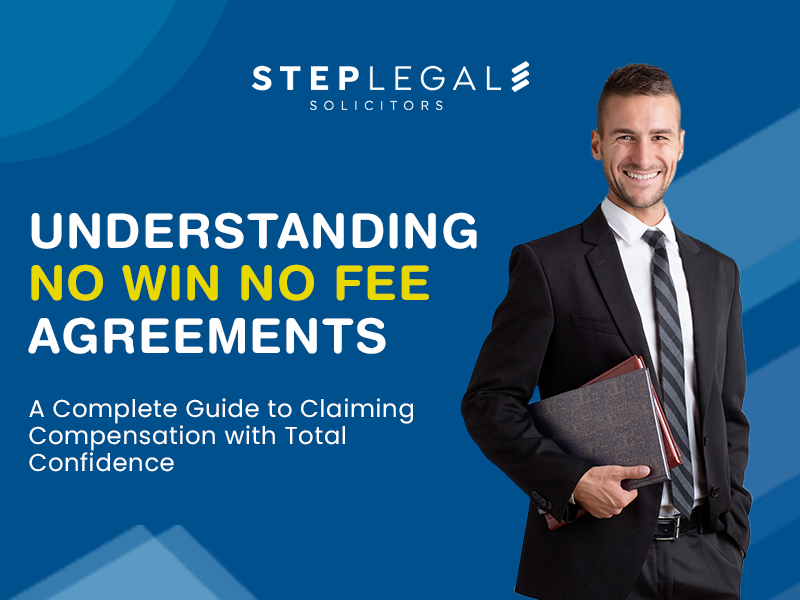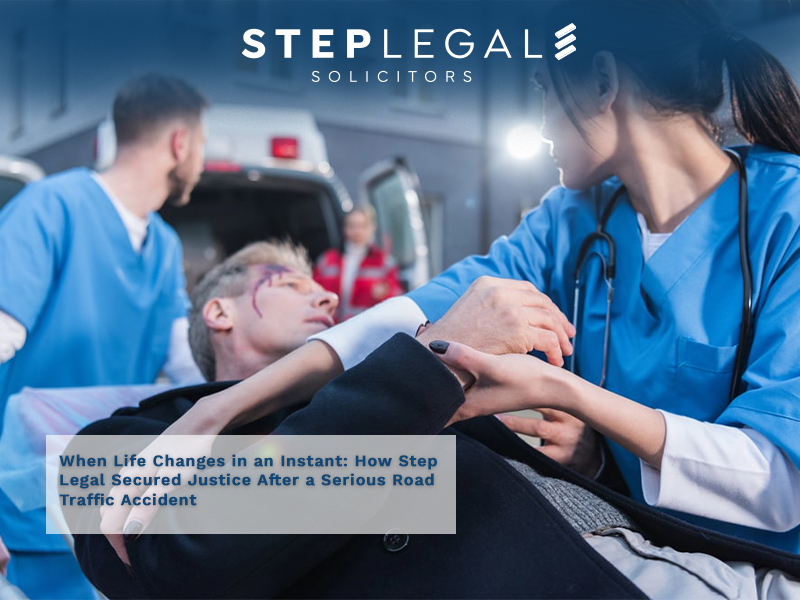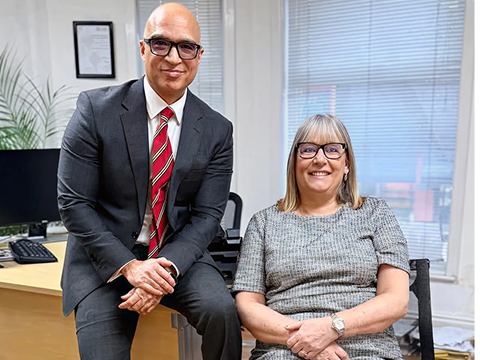
Understanding No Win No Fee Agreements A Complete Guide to Claiming Compensation with Total Confidence
Suffering an accident or injury that was not your fault can be one of the most onerous and emotionally burdensome experiences you’ll ever experience. Beyond the physical pain, there is often a long list of other challenges to deal with. You might face a loss of earnings because you are unable to work; medical bills, rehabilitation expenses, and travel costs to attend hospital appointments can quickly pile up. On top of that, the stress of trying to provide for your family while re
Covering from an injury can feel overwhelming.
At this stage, many people think about speaking to a solicitor to see if they can claim compensation. However, a big worry quickly arises: how much will it cost me to take legal action? Legal services have a reputation for being expensive, and it is not unusual for people to assume that pursuing justice could end up costing more than it is worth. For many, this fear alone is enough to stop them from taking any action at all.
This is where the concept of a No Win No Fee agreement has changed the legal system in the UK. These agreements were designed specifically to remove the financial barriers that prevent ordinary people from seeking justice. Instead of worrying about paying a solicitor upfront or being left with a large bill if the case is unsuccessful, claimants can proceed with confidence. If they lose, they pay nothing. If they win, they simply pay a pre-agreed percentage of their compensation to their solicitor
.
This article aims to give you a complete picture of how No Win No Fee works. We will explore its definition, its history, how it operates in practice, the advantages and potential risks and the kinds of cases where it is most commonly used. Unlike many short summaries you might come across online, this guide will provide detailed and concise insights into every aspect of the process.
What is a No Win No Fee Agreement?

At its core, a No Win No Fee agreement is a way of funding legal representation where you only pay if your case is successful. Its formal name in law is the Conditional Fee Agreement (CFA). Under this arrangement, a solicitor agrees to take on your case without charging you anything at the start. They carry the financial risk of working on your claim, and their payment is conditional upon winning compensation for you.
If your case is successful, the solicitor is entitled to a success fee. This is a percentage of the compensation you are awarded, usually capped at 25%. If the case is unsuccessful, you do not have to pay the solicitor for their work. This system means that you can pursue justice without worrying about the possibility of being left out of pocket.
To illustrate, consider the following scenario. Imagine you were injured in a car accident caused by another driver running a red light. You approach a solicitor who believes you have a strong case. They offer you a No Win No Fee agreement. They investigate the evidence, gather medical reports, and negotiate with the insurance company. If they secure £10,000 in compensation for you, they would take their success fee of £2,500 (25%), leaving you with £7,500. If they were unable to win the case, you would owe them nothing for the work they carried out.
This arrangement not only gives you peace of mind but also motivates your solicitor to work hard on your behalf, because their payment depends on success.
The History and Purpose of No Win No Fee in the UK
The introduction of No Win No Fee agreements in the UK was a response to growing concerns about access to justice. Before the mid-1990s, people who wanted to bring personal injury claims often had to rely on Legal Aid. Legal Aid is government funding designed to help those who cannot afford legal services. However, Legal Aid was never available to everyone and was particularly limited in personal injury cases. Many people who had been seriously injured simply could not afford to pursue a claim, even when they had strong evidence.
In 1995, the government introduced Conditional Fee Agreements (CFAs) as part of legal reforms. The idea was to replace Legal Aid in certain types of cases and to provide a fairer way for individuals to access justice. Under a CFA, the solicitor would only be paid if the case succeeded, and they would recover their costs from the compensation awarded. This shifted the financial burden away from claimants and onto solicitors, who were in a better position to assess the risks involved in taking on a case.
The system was further expanded in the 2000s as No Win No Fee quickly became the most common method of funding personal injury claims. In 2013, new regulations were introduced under the Legal Aid, Sentencing and Punishment of Offenders Act (LASPO). These reforms capped the percentage a solicitor could charge as a success fee and introduced rules to ensure that agreements were transparent and fair to claimants.
The purpose of all these changes was clear: to make justice more accessible, to reduce the reliance on taxpayer-funded Legal Aid and to ensure that people injured through no fault of their own had a realistic path to compensation.
How Does No Win No Fee Work in Practice?

Although the idea sounds simple, the process of a No Win No Fee claim involves several important stages. Understanding these stages helps claimants know what to expect and builds confidence in the system.
The process usually begins with an initial consultation. This is often free of charge and gives you the opportunity to explain what happened and how it has affected you. The solicitor will listen carefully and ask questions to assess whether your case has a realistic chance of success.
If the solicitor believes you have a strong claim, they will move to the case assessment stage. This involves gathering and reviewing evidence such as accident reports, medical records, witness statements and details about who may be legally responsible for your injury. If the evidence supports your claim, the solicitor will offer you a No Win No Fee agreement.
The next step is signing the agreement. This is a formal contract that sets out exactly what happens in both scenarios if you win or if you lose. It will specify the percentage of your compensation that will go to the solicitor as a success fee and will explain whether you need to take out an insurance policy (commonly called After the Event insurance) to cover the opponent’s legal costs if the case is unsuccessful.
Once the agreement is signed, the solicitor begins working fully on your behalf. This is the case preparation stage. The solicitor may gather further medical evidence, correspond with the defendant’s insurance company and attempt to negotiate a settlement. If a settlement cannot be reached, the solicitor may issue court proceedings and represent you in court.
Finally, the case reaches the settlement or trial outcome stage. If you win, you receive compensation, and the solicitor deducts their agreed success fee. If you lose, you do not pay your solicitor’s legal fees, and if you had taken out ATE insurance, it should cover other costs that might otherwise have fallen to you.
This step-by-step process makes clear that No Win No Fee is not just a marketing phrase. It is a structured, legally binding system designed to protect claimants and ensure fairness at every stage.
Why No Win No Fee Matters for Claimants
The real value of No Win No Fee lies in the way it empowers ordinary people. Without this arrangement, many would simply give up on pursuing justice because of the fear of financial ruin. The introduction of CFAs has meant that victims of negligence, whether on the road, in the workplace or in public spaces, have a fair chance of holding others accountable.
It also sends a strong message to defendants and insurance companies. Knowing that a claimant is represented by a solicitor who is financially invested in winning the case adds weight to negotiations. Insurers recognise that solicitors will not take on weak cases, so if a case is pursued under a No Win No Fee agreement, it is likely to have merit.
In other words, this system not only benefits claimants but also encourages efficiency and fairness in the wider legal process.
Benefits of No Win No Fee Agreements
The first and most obvious benefit is accessibility. Legal costs are a major barrier for most people. No Win No Fee agreements remove this barrier completely. You do not have to worry about paying a solicitor upfront, and you know from the start that if you lose, you will not be asked to cover their fees. This makes legal support available to anyone with a genuine claim, regardless of their financial position.
Another benefit is the motivation for solicitors to work hard on your case. Because their fee depends on winning, solicitors have a vested interest in building a strong claim, collecting evidence, and negotiating effectively. This gives you confidence that your representative is fully invested in the outcome.
A further advantage is peace of mind. Many people feel anxious about starting a claim because they imagine legal bills arriving in the post. With a No Win No Fee arrangement, that worry disappears. You can focus on your recovery while your solicitor handles the legal work.
Finally, these agreements encourage fair settlements. Insurers and defendants know that solicitors only take on strong cases. This increases the pressure to settle fairly rather than dragging out disputes unnecessarily.
Risks and Misconceptions
Despite the many benefits, there are also common misconceptions and perceived risks around No Win No Fee. One of the biggest myths is that it is “completely free”. While you do not pay anything upfront or if you lose, you will usually pay a success fee if you win. This fee is deducted from your compensation and is capped by law. Some people also need to pay for an insurance policy to protect against certain costs, although this too is explained clearly at the start.
Another misconception is that these agreements involve “hidden charges”. In reality, solicitors are legally required to set out all costs in writing before you sign the agreement. Transparency is part of the system, and a good solicitor will make sure you understand exactly what you are signing.
There is also the fear of being left with a bill if you lose. Again, the structure of a No Win No Fee agreement means this will not happen. If your claim fails, you will not pay your solicitor’s fees. Insurance policies are often used to cover any other potential expenses, such as the other side’s costs.
The key to avoiding problems is to work with a reputable firm. Firms that specialise in personal injury law will explain everything upfront, keep you informed at every stage, and make sure there are no surprises later.
Acting Dishonestly
It is important to note how the No-Win No Fee veil of protection for claimants’ costs can be pierced if the claimant has acted dishonestly.
In England and Wales, if a claimant in a personal injury no-win no-fee claim is found to have acted with fundamental dishonesty (under Section 57 of the Criminal Justice and Courts Act 2015), their entire claim can be struck out, even if part of it is genuine. In such cases, the claimant will lose the protection typically offered under a No-Win No-Fee arrangement, including protection against adverse costs. This means the claimant may be ordered to pay the defendant’s legal costs, which can be substantial. Additionally, they may also lose the benefit of any After the Event (ATE) insurance if dishonesty voids the policy, which it often will.
Who is Eligible for a No Win No Fee Claim?

Not every claim can be pursued under this type of arrangement, but most personal injury cases can. Eligibility usually depends on the strength of your case and the likelihood of success. Solicitors need to be confident that there is a good chance of winning because their payment depends on it.
The main factors that determine eligibility include:
- Liability: There must be clear evidence that someone else was at fault for your accident or injury.
- Evidence: Medical records, accident reports, photographs, and witness statements all strengthen a case.
- Time limits: In most personal injury cases, you must make a claim within three years of the accident or of discovering the injury.
- Impact of the injury: The extent of your physical, emotional, and financial losses will also be taken into account.
If your case meets these criteria, you are likely to qualify for a No Win No Fee agreement. Even if you are unsure, it is worth seeking legal advice. Many people underestimate the strength of their claim until a solicitor reviews the details.
Types of Cases Covered by No Win No Fee
No Win No Fee agreements are used across a wide range of personal injury claims. Some of the most common include:
Road Traffic Accidents Claims
If you have been injured in a car, motorcycle or cycling accident that was not your fault, you may be entitled to compensation. No Win No Fee is especially common in these cases because liability is often clear, and insurers are typically involved in paying settlements.
Workplace Accidents
Employers have a duty to provide a safe working environment. When they fail to do so, accidents can happen. Claims may arise from falls, faulty machinery, inadequate training or lack of protective equipment. No Win No Fee allows employees to hold employers accountable without fearing legal costs.
Medical Negligence
When medical professionals fail to meet the required standards of care, the consequences can be serious. Claims may involve surgical errors, misdiagnosis, or incorrect treatment. These cases can be complex, but No Win No Fee makes it possible for patients to pursue justice without financial risk.
Public Liability Claims
If you are injured in a public place, such as a slip or trip in a supermarket or a fall on poorly maintained pavements, you may have grounds for a claim. Local authorities, businesses, or property owners may be held responsible.
Serious Injury Claims
Some accidents result in life-changing injuries, such as brain damage, spinal injuries or amputations. These cases require extensive evidence and often lead to large settlements to cover long-term care and financial losses. No Win No Fee ensures victims can access specialist legal representation in even the most complex cases.
Why Eligibility Matters
Understanding whether your case is eligible is not just about saving money. It is also about managing expectations. No Win No Fee solicitors carefully assess cases to ensure they have merit. If a solicitor offers you this type of agreement, it is a strong sign that your case has a realistic chance of success.
On the other hand, if your case is not suitable for a No Win No Fee arrangement, the solicitor will explain why. This may be due to weak evidence, difficulties proving liability or the claim being outside the time limit. In such situations, they may suggest other funding options or give you advice on what further evidence is needed.
The Balance of Benefits and Risks
The balance between the benefits and risks of No Win No Fee agreements is important to understand. On one side, you gain access to justice without financial risk, legal representation from a motivated solicitor, and peace of mind throughout the process. On the other side, you need to be realistic about success fees and the possibility of needing insurance cover.
Ultimately, the advantages far outweigh the disadvantages for most people. The fact that solicitors are only paid if they win creates a level of fairness that would not exist under a traditional fee-paying arrangement. It also reassures claimants that their solicitor genuinely believes in the strength of their case.
What Happens If You Lose a No-Win Fee Case?
One of the main reasons people hesitate before starting a legal claim is fear of what will happen if they lose. The good news is that under a No Win No Fee agreement, if your case is unsuccessful, you will not have to pay your solicitor’s legal fees. This is the foundation of the arrangement and the very reason it exists to take away the financial risk for claimants.
However, there are a few important details to understand. While you do not pay your solicitor’s fees, other costs could arise if precautions are not taken. For example, if the court orders you to pay the other side’s legal costs, this can be expensive. To protect against this, most solicitors recommend that you take out an insurance policy known as After the Event (ATE) insurance. The premium for this insurance is usually only payable if you win your case, and it ensures that you are not exposed to financial risk if you lose.
In practice, this means that losing a No Win No Fee case will not leave you in financial difficulty. Your solicitor absorbs the risk of their own work, and the insurance policy covers you for other potential liabilities. This system is carefully designed to protect claimants from the very thing they fear most: being left worse off after trying to claim compensation.
Understanding Success Fees
The concept of a success fee is central to how No Win No Fee agreements operate. If your case is successful, your solicitor will deduct a percentage of your compensation as their fee. This is known as the success fee, and it is capped by law to ensure fairness. In most personal injury claims, the cap is 25% of the compensation awarded.
The percentage is agreed upon before you sign the agreement, so there are no surprises later. Transparency is a legal requirement, and reputable solicitors will explain in plain language exactly what will happen.
For example, if your solicitor wins £20,000 for you and the success fee is 25%, they will deduct £5,000, leaving you with £15,000. If the case had been unsuccessful, you would not have paid the solicitor anything.
It is worth noting that solicitors often recover their basic costs from the defendant’s insurance company. The success fee represents the additional reward for the risk they took by agreeing to act without upfront payment. This balance ensures that the system is fair for both claimant and solicitor.
How Much Compensation Can You Claim?
The amount of compensation you can claim under a No Win No Fee agreement depends on the nature of your injury, the impact it has had on your life, and the financial losses you have suffered. Compensation is typically divided into two categories:
- General Damages – This covers the pain, suffering and loss of amenity caused by the injury. The severity of the injury and its long-term effects are taken into account. For example, a broken arm may result in compensation of several thousand pounds, while a serious spinal injury could lead to much higher awards.
- Special Damages – This covers your financial losses and expenses caused by the injury. Examples include lost wages, the cost of medical treatment, rehabilitation expenses and travel costs. In serious cases, special damages may also cover the cost of future care, home adaptations and specialist equipment.
To give a sense of scale, compensation awards can range from a few thousand pounds for minor injuries to several hundred thousand pounds or even more for life-changing injuries. Each case is assessed individually, with medical reports and evidence playing a crucial role.
Factors That Influence Compensation Amounts
Several factors determine the size of a compensation award:
- The type and severity of the injury
- The recovery period and long-term prognosis
- Whether the injury affects your ability to work
- The cost of medical treatment and care
- The psychological impact of the accident
- The overall effect on your quality of life
Solicitors use official guidelines, known as the Judicial College Guidelines, to estimate the likely range of compensation for different types of injuries. These guidelines are combined with your personal circumstances to calculate a fair settlement.
Step-by-Step Guide to Making a No Win No Fee Claim
Bringing a personal injury claim under a No Win No Fee agreement follows a clear process. Knowing the steps involved helps you feel more confident and prepared.
Step 1: Free Initial Consultation
You begin by contacting a solicitor and explaining what happened. They will ask about the accident, the injuries you suffered and how it has affected your life. This consultation is usually free, and it gives the solicitor a chance to assess whether your case is suitable for a No Win No Fee agreement.
Step 2: Case Assessment and Agreement
If the solicitor believes your claim has a good chance of success, they will review the evidence and may request medical reports or witness statements. Once they are confident, they will offer you a No Win No Fee agreement, setting out in writing what will happen in both outcomes, win or lose.
Step 3: Investigation and Evidence Gathering
The solicitor begins building your case. This may include obtaining detailed medical evidence, interviewing witnesses, reviewing accident reports, and gathering documents that prove your financial losses. The stronger the evidence, the more likely the claim is to succeed.
Step 4: Notifying the Defendant
The solicitor formally notifies the defendant (the person or organisation responsible for your injury) of the claim. The defendant’s insurer is usually involved at this stage, and they may accept or deny liability.
Step 5: Negotiation
Most cases are settled without going to court. The solicitor will negotiate with the insurer to reach a fair settlement. This process may involve several offers and counter-offers. Your solicitor will keep you updated and advise whether to accept or reject an offer.
Step 6: Issuing Court Proceedings (if necessary)
If the defendant denies liability or refuses to offer fair compensation, your solicitor may issue court proceedings. This does not always mean the case will go to trial; many cases settle once court action is started.
Step 7: Final Settlement or Trial
The claim concludes either through a negotiated settlement or, in rare cases, a court judgement. If successful, you receive compensation, and the solicitor deducts the agreed success fee. If unsuccessful, you pay nothing to your solicitor, and any insurance policy covers other costs.
Why the Step-by-Step Process Works
This process is structured to give claimants full protection and clarity. Each stage is designed to build the case carefully, ensuring strong evidence and maximising the chances of success. At every point, the solicitor is motivated to work in your best interests because their fee depends on the outcome.
It also ensures that claimants are never left in the dark. Regular updates and explanations keep you informed, while the formal agreement provides peace of mind that there will be no unexpected financial shocks.
Why Choose Step Legal Solicitors?
When you are considering a No Win No Fee personal injury claim, choosing the right solicitor is just as important as understanding the agreement itself. The solicitor you select will not only represent you but also guide you through a process that can sometimes feel confusing or stressful. This is where Step Legal Solicitors stand out.
Step Legal is a specialist law firm with a focus on personal injury claims. The firm combines legal expertise with a client-first approach, ensuring that people feel supported from the very first call to the successful conclusion of their case. Unlike firms that operate at a distance or treat clients as numbers, Step Legal provides a personal and compassionate service. The emphasis is on clear communication, transparency about fees, and making sure clients feel fully informed at every stage.
Another reason to choose Step Legal is the firm’s strong reputation in handling a wide range of personal injury cases. From road traffic accidents to workplace injuries and serious, life-changing claims, the solicitors bring years of experience to the table. This means they know how insurers think, how to gather evidence effectively, and how to maximise compensation for their clients.
Above all, Step Legal offers trust. With a No Win No Fee arrangement, trust between solicitor and client is vital. Clients need to feel confident that their solicitor genuinely believes in their case and will fight for the best possible outcome. Step Legal builds this trust by being open, honest, and committed from day one.
Frequently Asked Questions About No Win No Fee
Yes, it is possible to switch solicitors during a claim if you are not satisfied with the service you are receiving. However, this can sometimes involve costs or agreements between the two firms. It is always better to choose the right solicitor at the start, but if you feel let down, you should not feel trapped.
If a solicitor decides they no longer believe your case has a strong chance of success, they may end the No Win No Fee agreement. In this situation, you will not usually be charged for the work already done. You can then seek a second opinion from another solicitor who may see the case differently.
The length of time varies depending on the type of claim and whether liability is disputed. Straightforward cases can settle in a few months, while complex cases may take a year or more. Serious injury claims can take even longer because they require detailed medical evidence and long-term assessments.
Most claims do not end up in court. The majority are settled through negotiation with the defendant’s insurance company. However, if the other side denies liability or refuses to make a fair offer, court proceedings may be necessary. Even then, many cases settle before reaching trial.
Compensation for personal injury is not usually taxable. However, if you invest your compensation or it generates income, that income may be subject to tax. Your solicitor can explain how this works in more detail if it applies to your situation.
In some cases, such as road traffic accidents involving uninsured drivers, there are schemes in place (like the Motor Insurers’ Bureau) to ensure victims can still claim compensation. Your solicitor will advise if this applies to your case.
Solicitors carefully assess the merits of each case. They look at liability, the strength of evidence, medical reports, and the likelihood of success. Because their payment depends on winning, they will only accept cases they believe have a strong chance of succeeding.
No. One of the key advantages of a No Win No Fee agreement is that there are no upfront fees. Everything is explained clearly before you sign the agreement, and you only pay if your case is successful.
The Importance of Transparency and Communication
One of the main concerns claimants have when entering a No Win No Fee agreement is whether there are any hidden costs. Step Legal addresses this by being completely transparent. The success fee is explained clearly at the start, along with any insurance requirements. Clients know from the very beginning what to expect, which removes uncertainty and builds trust.
Communication is another key area where Step Legal excels. Claimants are kept informed at every stage of the process. Whether it is updates on evidence gathering, negotiations with insurers, or developments in court proceedings, clients are never left in the dark. This regular communication reduces stress and reassures clients that their case is being handled with care.
Final Thoughts on No Win No Fee Claims
No Win No Fee agreements have transformed the way people access justice in the UK. By removing the fear of financial risk, they allow anyone with a genuine claim to seek the compensation they deserve. They ensure that victims of accidents, negligence, and wrongdoing are not left powerless simply because they cannot afford legal fees.
The system is fair, transparent, and designed to protect claimants. Success fees are capped, insurance covers potential risks, and solicitors are motivated to work hard on behalf of their clients. While misconceptions remain, the reality is that No Win No Fee agreements are one of the most effective tools for achieving justice in personal injury law.
For claimants, the key is to choose the right solicitor. A strong, experienced, and trustworthy solicitor can make all the difference, guiding you through the process with confidence and securing the best possible outcome.
Step Legal Solicitors represent exactly this standard. With experience across a wide range of personal injury claims, a commitment to transparency, and a client-focused approach, the firm provides the support and expertise claimants need. From the initial consultation to the final settlement, Step Legal stands alongside its clients, ensuring they never feel alone in the process.
If you have been injured in an accident that was not your fault, and you are worried about the cost of legal action, a No Win No Fee agreement may be the answer. You have nothing to lose and potentially everything to gain.



![Tomlinson v Congleton Borough Council [2003]_ A Landmark Case in Understanding Risk, Responsibility and Agency in Personal Injury Claims](https://www.steplegal.co.uk/wp-content/uploads/2026/01/Tomlinson-v-Congleton-Borough-Council-2003_-A-Landmark-Case-in-Understanding-Risk-Responsibility-and-Agency-in-Personal-Injury-Claims.jpg)












